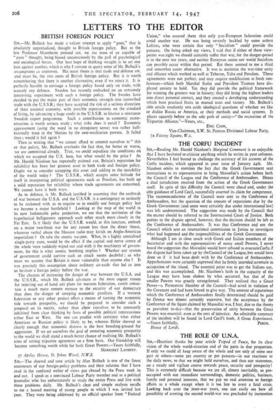LETTERS TO THE EDITOR
BRITISH FOREIGN POLICY
SIR,—Mr. Bullock has made a valiant attempt to apply "pure," that is absolutely unprejudiced, thought to British foreign policy. But as the late Professor Mannheim pointed out, we 'are none of us capable of " pure " thought, being biased unconsciously by the pull of psychological and sociological forces. Our best hope of thinking straight is to set one bias against another, which is why I venture to query some of Mr. Bullock's assumptions as unproven. His main thesis is that trade and defence area and must be, the two roots of British foreign policy. But it is worth remembering that there is another alternative, even if we reject it. It is perfectly feasible to envisage a foreign policy based only on trade, with scarcely any defence. Sweden has recently embarked on an extremely interesting experiment with such a foreign policy. The Swedes have decided to put the major part of their economic strength into intensified trade with the U.S.S.R.; they have accepted the risk of a serious distortion of their national economy, with possible repercussions on the standard of living, by advancing a huge credit to the U.S.S.R. to finance a strenuous Swedish export programme. Such a contribution to economic recon- struction is worth serious study ;- what risks does it entail ? Economic appeasement (using the word in no derogatory sense) was rather half- heartedly tried in the 'thirties by the non-totalitarian powers. It failed then ; would it fail again ?
Then in writing that "we cannot afford to commit ourselves to" this
or that policy, Mr. Bullock overlooks the fact that, for better or worse, we are committed already. True, we could repudiate the conditions on which we accepted the U.S. loan, but what would be the price ? As Mr. Harold Nicolson has repeatedly pointed cut, Britain's reputation for reliability has been her greatest asset in both trade and foreign policy. Ought we to consider scrapping this asset and adding to the instability of the world today ? The U.S.S.R., which accepts some latitude for itself in interpreting political agreements such as Potsdam, has built up a solid reputation for reliability where trade agreements are concerned. We cannot have it both ways.
As to defence, is Mr. Bullock justified in assuming that the outbreak
of war between the U.S.A. and the U.S.S.R. is a contingency so seriously to be reckoned with as to require us to modify our foreign policy lest we become a major battlefield ? Looking at the map of the world in its now fashionable polar projection, we see that the territories of the hypothetical belligerents approach each other much more closely in the Far East. Is it likely that the U.S.S.R. would, at this juncture, embark on a major two-front war for any reason less than the direct threat, whatever verbal abuse the Moscow radio may lavish on Anglo-American imperialism ? Or take the atomic weapon. What, in a highly centralised
single-party state, would be the effect if the capital and nerve centre of the whole were suddenly wiped out and with it the machinery of govern- ment, for this is what atomic bombing implies ? Whether any system of government could survive such an attack seems doubtful ; so why must we assume that Britain is more vulnerable than anyone else ? It was precisely this assumption about ordinary air-raids that led us into so hesitant a foreign policy before the war.
The chances of increasing the danger of war between the U.S.A. and the U.S.S.R., which Mr. Bullock advances as the most cogent reason for rejecting out of hand any plans for western federation, surely consti- tute a much more remote menace to the security of our democracy than does the danger of creeping economic paralysis. If a western federation or any other project offers a means of turning the economic tide towards prosperity, we should be prepared to consider siich a proposal on its merits, rather than allow ourselves to be constantly inhibited from clear thinking by fears of possible political repercussions either East or West. No one can predict with certainty what either American or Russian policy is likely to be, whereas Hitler showed us clearly enough that economic distress is the best breeding-ground for aggression. If we set ourselves the goal of restoring economic prosperity to the world we shall stand a much better chance of realising Mr. Bullock's aims of setting tripartite agreement on a firm basis. Our friendship will become something worth while for both Great Powers.—Yours faithfully,
Apsley House, St. 7ohns Wood, N.W.8.
MARGARET LAMBERT.


































 Previous page
Previous page